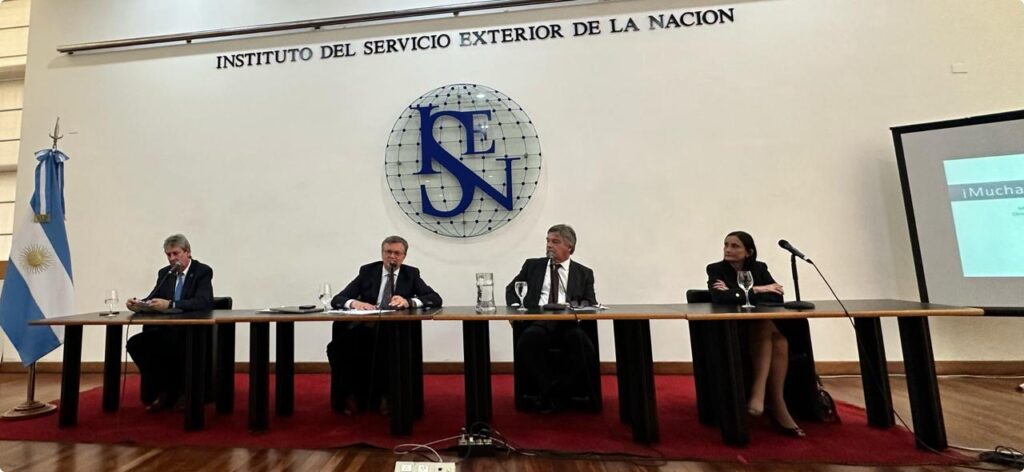
Buenos Aires, 23 April 2025 (IICA) – Speaking to students of the National Foreign Service Institute (ISEN), Argentina’s academy for diplomats, as well as members of the local diplomatic corps and officials of the country’s Ministry of Foreign Affairs, the Director General of the Inter-American Institute for Cooperation on Agriculture (IICA), Manuel Otero, highlighted the strategic value of the agriculture sector of Latin America and the Caribbean and the need to strengthen the region’s role as a pillar for food security.
While on official mission in Argentina’s capital, Otero was invited to deliver a keynote speech at ISEN before a large and distinguished audience. He provided a detailed assessment of the challenges facing agriculture in the world and the opportunities for Argentina and other Latin American countries, in light of demands for accessible, high quality food by a growing population as well as the uncertainties posed by the current geopolitical context.
The conference was held at ISEN’s auditorium in the Foreign Ministry’s building. Ambassador Marcelo Buffetti delivered the opening remarks, while closing remarks were made by José Martins, President of the Buenos Aires Grain Exchange—whose 170-year history makes it the country’s oldest business entity.
For his part, Martins emphasized the importance of coordination between public institutions and the private sector.
Towards the end of the conference, several participants posed numerous questions to Otero regarding the positioning of agricultural producers in global markets and the role of international agencies. Among them were Ambassador Nora Capello, Director of the Secretariat of International Economic Relations, who reflected on IICA’s role in different cooperation projects that Argentina has carried out with Central American and Caribbean countries.
Food security and environmental sustainability
During his speech, Otero highlighted the importance of Argentina’s agriculture, the fact that the country is not merely an exporter of raw materials, the profound interaction between its agriculture sector and the fields of science, technology and innovation, as well as its entrepreneurial capabilities. He also emphasized that agriculture in Latin America accounts for almost 10% of Gross Domestic Product (GDP), generates 22% of jobs and accounts for 18% of total international agricultural trade.
“We are a very strong region, and we must begin to believe more in ourselves. We must improve our self-esteem, because this is a strategic sector, not only in the present, but for the future as well”, he stated.
In that regard, the IICA Director General underscored the fact that the region is a guarantor not only of the planet’s food security, but also its environmental sustainability, given that it is home to a significant portion of its water resources and tropical forests.
In his speech, Otero also pointed out the need to promote a new narrative that reflects the reality of agriculture as a strategic sector to develop national economies and drive social inclusion, in a predominantly urban world with a tremendous need to strengthen and foster the well-being of rural communities.
“There are 17 and a half million family farmers in our region. They must remain in rural areas because they are the social fabric that gives life to rurality”, he remarked.
“In agriculture today, we must worry not only about the abundance of food, but also its quality. Another important issue is the energy transition, given that the countryside currently makes great contributions to the new renewable energy matrix. And this is all taking place within the framework of a new frontier of knowledge. An unprecedented technological revolution is creating Agriculture 4.0. In that regard, and with the help of the private sector, we must defend national research systems if we are to remain key players in the world”, he added.
The IICA Director General also referred to the positive role that agriculture can play in overcoming the environmental crisis, as the only sector of the economy that has the capacity to mitigate climate change by acting as a carbon sink while also producing. “In addition to the carbon footprint of the production process, we must consider the carbon balance, which takes into account absorption in soils”, he warned.
In closing, Otero considered that the world requires a knowledge-intensive agriculture sector with a human face. “The next 25 years will be decisive, because fundamental changes lie ahead. We need strong institutions and we must trust in tomorrow’s agriculture as a tool for driving peace and sustainable development, generating jobs and well-being, and building bridges between rural areas and cities, within the framework of a transformation process that is already underway”.
More information:
Institutional Communication Division.
comunicacion.institucional@iica.int











